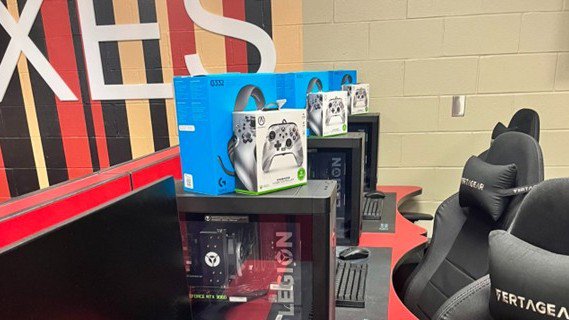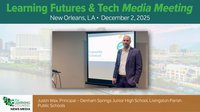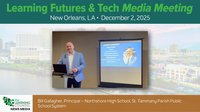Growing up in the 1980s and 1990s, I have vivid memories of immersing myself in the world of Atari, Nintendo, and Gameboy. Back then, it felt like technology had transformed the lives of children overnight. I would spend countless hours on summer nights, winter breaks, and weekends, determined to conquer the next level of Zelda. However, my mom would often enter my room on school nights, urging me to stop playing video games, convinced that they would never contribute to my future in college or the job market. Looking back, I can't help but reflect on how mistaken she was in her assessment. The reality is, the 162 billion video game industry and the advancements in technology have opened incredible opportunities for education and career prospects, defying the expectations of the past.
As educators, we must embrace technological innovation to reach the students we are currently serving. By leveraging technology, we can create dynamic and engaging learning experiences that not only enhance academic outcomes but also spark curiosity in students. Interactive and gamified learning environments, much like the ones that captivated me as a child, have the power to inspire students to ask questions, explore new ideas, and develop a lifelong love for learning. Encouraging curiosity through technology can help students become critical thinkers, problem solvers, and innovators in the 21st Century.
College Ready and Esports
Esports, once seen as a mere hobby or pastime, has evolved into a platform that not only entertains but also prepares students for the challenges of college and offers them a pathway to secure scholarships. According to EsportScholar, “Over 16 million in college scholarships were awarded to students in the United States during 2020-2021” (2023). In recent years, competitive gaming has gained significant recognition as a legitimate sport, attracting the attention of universities and educational institutions worldwide. Participating in esports equips students with essential skills such as teamwork, strategic thinking, communication, and problem-solving, all of which are highly valued in the academic setting.
Additionally, the dedication and discipline required to excel in esports mirror the commitment required in traditional sports, demonstrating a student's ability to balance academics and extracurricular activities effectively. Recognizing the immense potential of esports, colleges and universities now offer scholarships specifically for talented gamers, providing them with opportunities to pursue higher education while continuing their passion for competitive gaming. As a result, esports has become a valuable avenue for students to not only gain admission to colleges but also secure financial aid that can significantly alleviate the burden of tuition fees. Gawrysiak and Besombes state, “The number of higher education academic esports programs world-wide is increasing” (2021). Currently there are programs in most countries to include Austria, Canada, China, England, Fineland, France, Germany, Spain, South Korea, and the United States (Gawrysiak & Besombes, 2021). In this rapidly evolving technological landscape, esports stands as a testament to the power of gaming in preparing students for the challenges of college while also opening doors to educational opportunities previously unexplored.
Career Readiness and Esports
Esports offers a unique avenue for students to develop the skills and aptitudes necessary for careers in IT, cybersecurity, and various other professional fields. Competitive gaming cultivates a strong foundation in technology, as players must navigate complex gaming systems, master intricate strategies, and troubleshoot technical issues. This hands-on experience provides students with a deep understanding of digital platforms, hardware, and software, fostering their technical proficiency. Moreover, esports promotes critical thinking, problem-solving, and adaptability, skills vital in the ever-evolving world of information technology and cybersecurity. There are vast benefits that far exceed the learning that takes place in the classroom that prepares students for careers by equipping them with transferable skills like teamwork, communication, and critical thinking (Gawrysiak & Besombes, 2021).
The fast-paced nature of competitive gaming requires players to make split-second decisions, analyze opponents' moves, and adjust strategies, accordingly, mirroring the dynamic challenges encountered in IT and cybersecurity professions. Additionally, teamwork and effective communication are crucial components of successful esports teams, reflecting the collaborative environments found in professional work environments. By participating in esports, students develop leadership abilities, learn to work in diverse groups, and enhance their communication skills, all of which are highly sought after in IT and cybersecurity job roles. Gawrysiak and Besombes state, “A common misconception is that esports academic programs exist to train players to compete professionally, but the majority of current programs are in place to educate and train a future workforce in support of the professional and amateur competitive esports scenes” (2021). Consequently, esports serves as a powerful platform for students to cultivate the technical expertise, critical thinking, adaptability, and teamwork skills necessary for successful careers in the rapidly expanding fields of IT, cybersecurity, and beyond.
Military Careers and Esports
Esports plays a surprising role in preparing students for military careers. Competitive gaming offers a unique training ground where individuals develop skills that directly translate into the military domain. Lange states, “As the esports industry continues to grow exponentially, nearly every branch of the military now has an official service-sanctioned gaming program (2021). One crucial aspect is the emphasis on teamwork and collaboration. In esports, players must communicate effectively, coordinate strategies, and synchronize their actions with their teammates, mirroring the cooperative nature of military operations. Moreover, esports instills discipline, perseverance, and mental resilience in participants, traits that are highly valued in military settings.
The intense training regimens, the pressure of competitive matches, and the need to continually improve all contribute to the development of mental fortitude and the ability to perform under high-stress situations crucial in military environments. Additionally, esports fosters strategic thinking, situational awareness, and adaptability as players analyze opponents' moves, devise counterstrategies, and adjust their tactics on-the-fly. These skills align with the military's need for individuals who can think critically and make sound decisions in dynamic and unpredictable circumstances. Lange states, “While the Army and Navy programs fall under recruitment commands, Air Force Gaming serves a different purpose. Its mission is to build morale and mental health resiliency while supporting force retention through competitive leagues” (2021). Furthermore, the digital literacy gained through esports, including familiarity with advanced technologies and information systems, proves invaluable in modern military operations, which heavily rely on technology and digital communication. Overall, esports serves as a surprising yet effective avenue for students to develop the teamwork, discipline, mental resilience, strategic thinking, and technological proficiency needed to excel in military careers.
Secondary Education
In Dorchester School District Two, we have fully embraced the potential of Esports within our Career and Technology Education department (CTE). With its natural connection to the IT, Cyber Security, and Media Technology pathways, Esports presents an exciting opportunity for our students. Furthermore, we are thrilled to announce that Esports also ties into the newly developing pathway under CTE, JROTC. Over the course of 2023, our school district witnessed the rise of multiple teams competing in after-school Esports clubs. As the popularity and success of these clubs grew, we recognized an invaluable curriculum opportunity that would greatly enhance the learning experiences of our students both inside and outside the traditional classroom setting. As we look ahead to the 2023-2024 school year, Dorchester Two is committed to furthering the integration of Esports into our educational system. To support this initiative, we have made the decision to install dedicated Esports gaming labs in each of our high schools. With this expansion, we aim to provide enhanced opportunities for our students to engage in Esports and develop their skills and talents. Additionally, we have plans in motion to extend these opportunities to middle school students soon, ensuring that Esports becomes an integral part of their educational journey as well.
Esports has emerged as much more than a recreational activity I experienced in my youth, presenting students with numerous opportunities and preparing them for various aspects of their future college and career paths. Whether it be college scholarships, careers in information technology and cybersecurity, or even military service, competitive gaming equips students with valuable skills and experiences to be successful in their future endeavors. The collaborative nature of esports fosters teamwork and effective communication, essential attributes in academic, professional, and military settings. The strategic thinking, adaptability, and problem-solving skills developed through competitive gaming translate directly into fields that require quick decision-making and dynamic problem-solving. Moreover, the technical expertise and digital literacy gained through esports open doors to educational and career pathways in technology-related disciplines.
Beyond scholarships and skill development, Esports also encourages curiosity by immersing students in an interactive and intellectually stimulating environment. The complexity of competitive gaming encourages students to explore advanced strategies, analyze game mechanics, and engage in continuous problem-solving. As students navigate these digital landscapes, they develop a natural inclination to ask questions, seek solutions, and refine their approaches, mirroring the scientific process and critical thinking required in academic disciplines.
In this rapidly evolving technological landscape, esports stands as a testament to the power of gaming in preparing students for the challenges of college while also opening doors to educational opportunities previously unexplored. By harnessing the curiosity sparked through esports, educators can create meaningful learning experiences that connect with students in ways traditional methods may not. As esports continues to gain recognition and support, its impact on student development and future opportunities cannot be ignored. With its ability to bridge the gap between recreation and preparation, esports has proven to be a valuable platform for students to grow, learn, and thrive in a world increasingly driven by technology, innovation, and collaboration.











